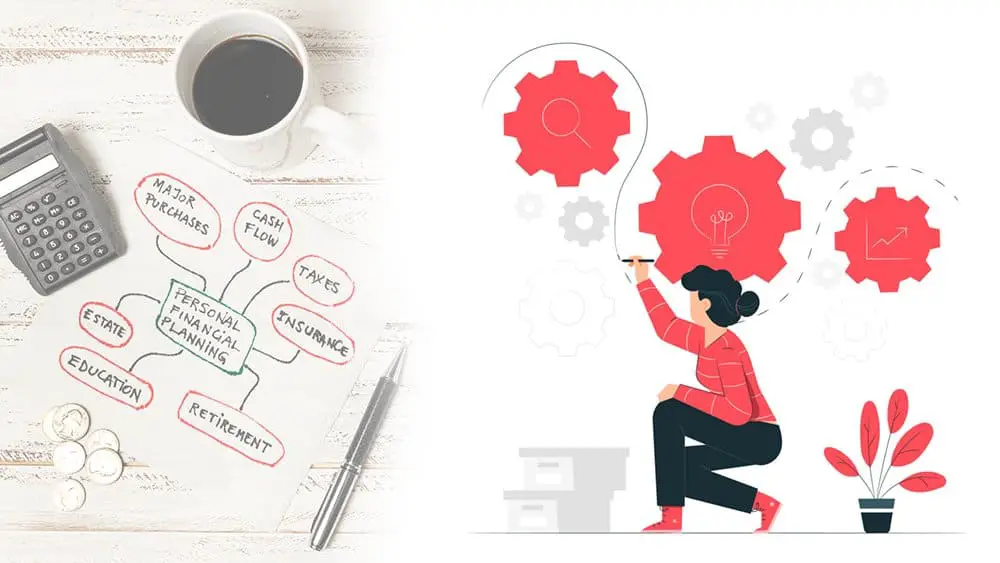When it comes to personal finance, having a solid cash flow is extremely important to have sustainable growth in your savings & investing goals and making sure all your various bills are paid.
The quickest thing you can do to increase cash flow for your personal finances today is to review your numbers in order to find ways to increase your income and decrease expenses. Everyone has unique goals, unique bills, and different streams of revenue, but having a solid positive cash flow on a monthly basis will help you increase the likelihood that you’ll meet all your financial goals.
Having extra cash in your savings account is great, and meeting your all monthly payments like your mortgage payments is great too. The thing with cash flow is to always work towards a constant “stream” of cash coming to you every month, instead of periods of feast & famine.
So what is cash flow?
It’s your monthly income – monthly expenses = monthly cash flow.
I’ve always worked for myself, running a small business. I’m over the 10-year milestone and have learned a lot about making money. In the first few years, I would get work that would range from a lot some months, to barely anything other months.
5 years into my business, I learned about cash flow and how it’s so important to have positive cash flow on a monthly basis. I started forgetting about getting big one-time projects and started figuring out how I could get consistent cash flow to use for all my savings and investing goals, and pay all my bills.
How can I improve my cash flow?
You might also have your own small business, or you might be working for a large company. Whatever your job is, you can benefit from looking at your current income stream and list of expenses to see what can be optimized.
First, let’s look at income.

If you’re working for a company, you have cash flow there by means of that 1 stream of revenue. Do you have any other sources of monthly income?
If you’re an investor, like many who frequent this site, you might have invested in high-dividend yield stocks that pay out yearly, quarterly, or even monthly. That would be another source of cash flow, even if you’re redirecting that income to reinvest back into more stocks.
Make a list of all the sources of income you generate on a monthly basis, each would count as a stream of money towards your monthly cash flow.
If you only have 1 source of income, your current monthly or bi-weekly paycheck, it might be a good time to consider options for a side hustle. This could be an online job like doing freelance work, or an offline job like taking on Uber driving jobs.
The goal is to get as many revenue streams as you can on a monthly basis, so you’re not entirely reliant on one, even if your salary will usually take up more than half of your monthly revenue.
Next, let’s look at your expenses.

You’ll have some necessary monthly expenses like mortgage debt, life insurance premiums, credit card bills, and other loan payments like student loan debt.
The goal here is to keep these as small as possible, so more of your monthly income stream is available for savings & investing goals.
Your situation will always be different than anyone else you know, so consider all the expenses you have, your loan payment details, and see what balance works best for you.
For example, say you listed out your streams of income and listed out your expenses, and saw that your car will be paid off in 8 months. If it’s something like 5% interest on your car loan, you might decide that it’s best to allocate more of your monthly income towards paying off the car, even if it means weaker cash flow for the next 8 months.
Look at things short term and long term to get a balanced idea on your financial decisions. Adding more money to your emergency fund won’t do you much good if you have a hefty credit card debt balance that needs to be paid off ASAP.
After you’ve listed things out, you might want to do a quick debt-to-assets check to see how you’re looking and review it on a monthly basis to see if you’re reducing your debt and increasing on the other end. It’s like a very quick net worth check, highly recommend you do this.
Why is cash flow important anyways?
It’s easier to answer and understand if you’ve been down this road before. If you’re 40 and have always had consistent employment, then your cash flow was mostly stable. A lot of Millenials are moving into the freelancer type work field, where you work on something you love and hiring is infrequent.
It might be that you’re doing both freelancing while you have a steady paycheck. This is when you understand the importance of cash flow even more.
For me, it was when I noticed such a feast and famine with my small business income. It’s great to have a good month, but I need cash flow every month to take care of my monthly bills and also put towards my financial goals.
Cash flow is important because you always need that firepower to accumulate and delegate towards your financial goals so that you can constantly be moving towards them.
On top of that, it was a huge mindset shift for me when I smoothed out my income curve by getting consistent monthly income. It helped me predictably allocate a certain amount (or percentage) of my cash flow towards savings and investing goals.
I’d say that setting that habit, as I have been doing for the past 4-5 years, has dramatically helped me not only get in the mindset that I will achieve financial freedom much sooner but move far away from any financial problems.
My financial state is much healthier because the cash flow I have allows me to pay all my bills, and then allow me to play with the rest of the money towards wealth creation.
I can, and do, add a fixed amount of money every month towards the family emergency fund, towards each spouse’s Roth IRA, and also other financial goals (like saving for a future house down payment).
What are some good cash flow tips?

- When you’ve figured out your cash flow situation and have the hang of it for a few months, consider where you put your very liquid money. You want to get the best interest rate possible, so as to optimize the growth of all the money you earn and keep.
- Always aim to have more than 1 source of income, you never know what can happen to your most consistent and biggest source of monthly cash flow.
- When it comes to allocating cash flow towards savings goals, consider having different savings accounts for different goals. This can easily be done with most online banks these days.
- Look at all your expenses and consider working with any company to get a better rate or cancel entirely. I’ve done this with Verizon and cut my phone bill quite a bit, just by asking and spending a good hour or so getting it completed. I also got discounted from other brands like Comcast by setting up autopay, saving $120/year within minutes.
- Monitor your cash flow, both money coming in and what’s going out. I use a very simple but effective Google Sheets file and monitor it regularly to see how well my financial situation is.
- To increase your cash flow, you can either ask for more money or add new sources of revenue. I would recommend you do both. If you work for a company, you can work on a plan to ask for higher pay. If you work for your self, you should always be improving your skills to get higher pay.
- As you work towards a well balanced monthly cash flow, remember to plan to pay off debt so that it’s not a burden for much longer. Things like a mortgage might not be easily removed, maybe you can consider adding $50 to $100 more to pay directly towards the principal on a monthly basis. Other things like your car loan and any credit card debt could be removed quickly if you focus on paying off higher chunks of it on a monthly basis.
Boost your earnings, cut your expenses, and pay off your debts
Cash flow is now one of my favorite words, I love discussing it with anyone who’s open to the topic. I never really focused on it much until I read Robert Kiyosaki’s “Retire Young Retire Rich” book. He also spoke about it in his Rich Dad Poor Dad book as well.
I hope this insight, and all the links I shared in this post, help you get focused on your income and expenses (and debt) so you can have a good plan to increase your cash flow and allocate it to all the important things in your life.

